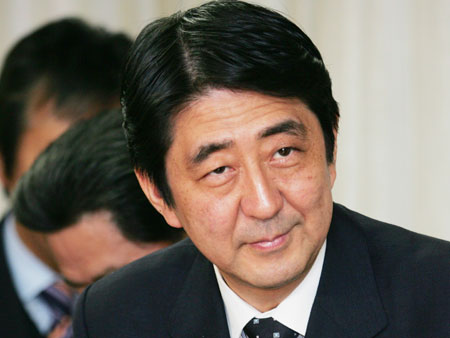China expressed hope yesterday that the new
Japanese leadership works to improve frayed bilateral relations.
The remarks came after Shinzo Abe, president of Japan's ruling Liberal
Democratic Party (LDP), was elected prime minister in a parliamentary vote
earlier in the day.
"We hope the new Japanese leader can make positive efforts to improve and
develop Sino-Japanese relations," Foreign Ministry spokesman Qin Gang told a
regular news briefing in Beijing.

Japan's prime minister-in-waiting
Shinzo Abe attends an executive meeting of his ruling Liberal Democratic
Party at the party headquarters in Tokyo September 25, 2006.
[Reuters] |
The youngest Japanese leader since World War II, Abe, 52, announced a
17-member cabinet later yesterday. Among them, outspoken Foreign Minister Taro
Aso, 66, who shares many of Abe's conservative views, kept his portfolio, while
former director-general of defence, 65, was named to the defence post.
Koji Omi, 73, a former economic planning agency chief, was named finance
minister, while economics professor Hiroko Ota takes over as economics minister.
Qin said China hopes Abe will "match words with deeds over the issue of
placing importance on Asian diplomacy."
In the run-up to the election, Abe has stressed that improving relations with
China was a priority.
Qin also repeated China's opposition to prime ministerial visits to the
Yasukuni Shrine in Tokyo, which, among others, honours war criminals.
Relations between China and Japan are at their worst in decades because of
Abe's predecessor Junichiro Koizumi's repeated visits to the shrine, seen by
China and some other Asian nations as a symbol of Japan's past militarism.
"China's position on the issue of Yasukuni Shrine is consistent and clear,"
Qin said.
Due to Koizumi's obstinate persistence in visiting the shrine, China has
refused to hold summit meetings with Japanese leaders.
"On the question of the timing and conditions for a meeting between the
leaders of China and Japan, we have repeatedly clarified our position," Qin
said.
Sub-cabinet level talks continued yesterday in Tokyo, led by Vice-Foreign
Minister Dai Bingguo and his Japanese counterpart Shotaro Yachi. Although no
specifics are available, speculation has been rife that the talks are an attempt
to pave the way for a summit between the leaders of the two countries.
Asked when the talks would end, Qin said they "will continue as long as
needed", without elaborating on the details.
Addressing a question on the stalled Six-Party talks aimed at denuclearizing
the Korean Peninsula, Qin said China supports and encourages the United States
and the Democratic People's Republic of Korea (DPRK) to hold direct bilateral
talks.
"We hope they, as the major responsible parties, can resolve the relevant
issues through negotiations with flexible and pragmatic attitudes", Qin said.
The spokesman said China and the Republic of Korea (ROK) are preparing for a
visit to Seoul by Vice-Foreign Minister Wu Dawei for promoting the resumption of
the talks.
"China will continue to make constructive efforts and we hope the concerned
parties make constructive efforts, too", Qin said.
The talks, involving China, the DPRK, the United States, the ROK, Russia and
Japan, stalled after the first phase of the fifth round of talks ended last
November.